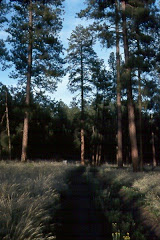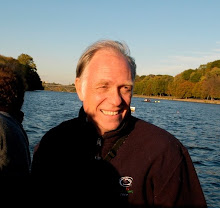
"Which of the wanderers through these different mazes will step forward at the call for the real Herbert Simon? All of them; for the "real" self is an illusion. We live each hour in context, different contexts for different hours. To say, truly that we are actors does not make us "unreal" or hypocritical. We act our lives within the mazes in which Nature and society place us." (Simon, 1991)
I've played around quite a bit with a concept called "context moment." The essence of it is that it is a unique state that gives birth to emergent phenomena. Which is that we are all really travelers through space and time and therein is the seedbed for something new. My only question is how different is your context moment in terms of, maybe not speed, but of a something (i.e., metric) that represents you. And how can you/we relate/access/share/save your/our corner of the world.
It is interesting that the reason for this little traverse arises from my delving into knowledge management concepts, essentially trying to leverage what each of know, so that our own employers/organizations potentially can tap into the wellspring of baby boomer knowledge for future use (given that most of the baby boomers, including me, will be retiring in the next few years). As it happens I read a couple of articles by Alex and David Bennet pertaining to the "next generation knowledge organization." They have written and are writing quite a bit on the field. Much of which is thought-provoking and characterizes "an environment of rapid change, high complexity and large uncertainty." New technologies play a major role in this mix.
In "Connections: new ways of working in the networked organization," Sproul and Keiesler (1991) discuss a two-level perspective on technology involving efficiency and social systems. Sproul and Kiesler argue that there are second-level effects (as opposed to looking at first-level effects) that correlate with "new uses of technology, new ways of working and living, new skills, and new ways of thinking." The authors suggest that these changes are deviation-amplifying effects. The consequence of these small changes or effects is-akin to the butterfly effect or perhaps tipping point-a new permanent state.
Herbert A. Simon said, "In describing my life. I have situated it in a labyrinth of paths that branch, in a castle of innumerable rooms. The life is in moving through that garden or castle, experiencing surprises along the path you follow, wondering (but not too solemnly) where the other paths would have led; a hueristic search for the solution of an ill-structured problem. If there are goals, they do not so much guide the search as emerge from it. It needs no summing up beyond the living of it."
Herbert is "my favorite modeller." Yet, pending changes, I leave my model behind. This is not so much by choice but as a consequence of where 'we' are. Knowledge, connections and relationships, in virtual space and time, will re-create our world and our place in it-essentially delegating the task of discerning reality.
Related references:
Pierre Teilhard de Chardin
Technological singularity


No comments:
Post a Comment